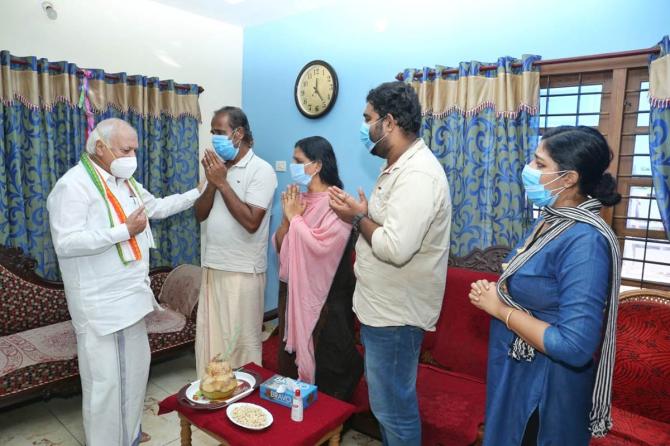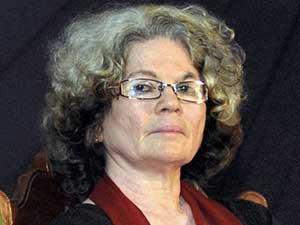'What we see today is bargaining.'
'The man's family sets a price for him and then they start bargaining.'
'He is sold to the family that offers the highest price.'
'In this market, a woman is just a commodity to be sold because if she remained at home, it is a humiliation for the family.'

According to the National Crime Records Bureau , in 2019 one woman died every hour due to issues relating to dowry, and a woman was subjected to cruelty by her husband and in-laws in every four minutes.
If in 2010, 2,715 dowry harassment cases were reported in Kerala, in 2021 between January and May, there were 1080 cases.
In June 2021, in a span of one week, three young women ended their lives due to violence related to dowry.
And this is happening in the so-called literate and progressive state like Kerala that has more women than men!
Sara Joseph is a Sahitya Akademi award-winning writer, a Malayalam professor and an activist who had started Maanushi in 1985 along with three colleagues of hers, to fight against dowry-related domestic violence in Kerala.
Almost four decades later, Professor Joseph is hopeful of a better future for the women in Kerala as she sees a slow change happening among the new generation of men and women, in discussion with Rediff.com's Shobha Warrier.
Kerala is described as a progressive state where the female literacy rate as high as 95% and the sex ratio is better than any other states in India.
Still, in the last one week, three dowry deaths were reported in Kerala.
Can we call Kerala a progressive state?
If you look at Kerala from the point of view of women, Kerala is not at all a progressive state. There is absolutely no doubt about it because the state follows a very deep-rooted morality code for women.
How did it become so deep rooted in a society that follows the matrilineal system?
Even when it was matrilineal, it was patriarchal.
We always say that women had voice and authority in the matrilineal Nair tharavad. But in reality, they didn't as all the decisions were taken by the senior most male member of the family, and not a woman.
Then, Nair women had to satisfy the younger male members from the Namboodiri household in the name of sambandam as only the eldest member could marry a woman from the Namboodiri community.
It was quite evident that Nair women had no freedom to choose the person to have sambandam with, or how run the family finances although she owned the property.
So, if you look at Kerala society as a whole, we see patriarchy ruling in every aspect of a woman's life.
With colonisation, the outlook of society moved towards the Victorian moral standards within the family and alos in man-woman relationships. It was then that the idea of sin crept into sexual relationships, and morality became a burden on women.

You mean, before colonisation, society was more liberal towards sexual relationships?
Yes, it was more liberal, but feudal. In a feudal set up, sex was used, misused and enjoyed only by the feudal landlords. A woman had no choice or say in it. She had no freedom even to live with the person she preferred.
In the colonial system, nuclear families replaced the joint family system that prevailed in Kerala for so long.
Unfortunately, the mindset of both men and women is still based on feudalism, and colonial morality. Even today, no political party or system could change this mindset.
It is true that the Progressive Movement in Kerala happened with the idea of giving more freedom to women. But then, there was no effort to liberate women and create a society that was equal to both men and women.
The movement resulted in some minor changes within patriarchy, but it could not provide equality to women or their liberation.
It is said that once a woman starts working, once she is financially independent, she will be empowered.
Why is it that even after becoming financially independent, young women of Kerala had to face harassment after marriage?
That is the question we have to ask ourselves.
The Communist ideology in the early days believed that every problem in society could be solved by resolving the class difference. If they had looked at women's issues from women's perspective, they could have solved it then itself. But they didn't address it the right way.
The fact is, the issues faced by women will never be solved by looking at it from the point of view of financial independence alone.
I would say the status of women in society is directly connected to certain morality codes and the patriarchal family system.
For example, even today, the mindset of society is that a woman should be a kanyaka who belongs to somebody. The assumption that a girl belonged to somebody else, gave rise to dowry in Indian society.
In the old Kerala system, women stayed back in her tharavad even after marriage.
But from such a system, we have moved on to a state where women are looked upon as commodities.
I would say, the reason for that is the influence of colonial morality standards of a capitalist society. With the advent of nuclear families, women were expected to go to her husband's homes after marriage.
Earlier you asked me about economic independence. The fact is, these women may be economically independent but they are not culturally independent.
In a majority of the families, women just hand over her pay packet to her husband. It is also considered that the main income of a family is that of the man's, and the woman's contribution is looked upon as just an addition even when both are in the same profession and earn the same amount of money.

Is the woman not responsible for the situation she is in?
Why doesn't she fight for equality if she is as economically independent?
You have to understand how she was brought up, and what moral standards were drilled into her mind.
Even as a child, it is drilled into her that she is inferior to a man, that she is inferior to her husband. She has been taught to walk behind him, take care of him and remain faithful to him. So, she applies sindoor on her forehead to proudly display that she has a husband.
A woman who follows all these norms is accepted as a 'tradition-bound' woman. So, from childhood onwards, she has been taught to be a tradition-bound woman.
You asked me, are women not responsible for the pathetic situation they are in? The problem is, she cannot break free from the image she was taught from childhood; that she has to be a tradition-bound woman, and not a woman with independent thinking.
She has not been brought up to have the power to react or retaliate to a violent situation. She has been brought up not to raise her voice. She has been taught that her life will be ruined and society would mock her if she came out of a marriage.
She has been brought up to be a silent creature.
And it continues even today.
In the name of dowry, we see a lot of bargaining happening in the marriage market. The man's family always wants a higher price for him...
Yes, what we see today is bargaining. The man's family sets a price for him and then they start bargaining. He is sold to the family that offers the highest price.
Along with money, the girl's parents give their daughter also; an addition. This is what is happening in the marriage market today.
In this market, she is just a commodity to be sold because if she remained at home, it is a humiliation for the family.
A change will happen only when parents of a girl let her decide whether she wants to marry or not, whether she wants to remain single or not, and let her live the life she wants.
Would you say only a progressive society can give a girl the freedom to choose her life?
Yes. That's why I said in the beginning that Kerala is not a progressive society.
Have we ever had discussions on man-woman relationships? We shudder to talk about sexuality.
Our society cannot separate sexuality from marriage.
What is an arranged marriage? It is just the society giving sanction or permission to a man and a woman to have sex as it wants to suppress the biological need of human beings till they get married.
Acceptance to marriage is there only if it happens within the parameters or guidelines set by the society. If not, it is not accepted.
Parents of girls try their best to get this acceptance from society. In fact, it is a huge burden on them. That's why they are ready to give whatever the boy's side demands so that they could pack off their daughter.
If we look at the recent deaths of young women, the major reason behind them ending their lives was not just harassment, but physical abuse too.
Domestic violence in the name of dowry is increasing day by day in Kerala ...
Let me tell you about the reason why we, four college professors and a few students started Maanushi in 1985 was the sudden increase in the number of dowry deaths and domestic violence in Kerala.
Our first project was a play against the very idea of dowry, and we performed it as a street play.
If you ask me whether it was easy, I would say, no. We were attacked, abused and threatened not only by people, but by political parties too. Braving all the attacks, we went to many parts of Kerala with our street play.
Were you able to impact the attitude of society?
We could impact the attitude of society in a small way, but you have to understand something; this is a wound that has gone so deep that it would take a lot of time and effort to heal.
There was a law against giving and accepting dowry, but what is a law if it is not implemented properly?
When we were agitating, do you know what the political parties including the Left said? That there is no problem in the society that affects women alone!
Is it not patriarchy playing in this attitude of political parties too?
Of course. Without any doubt, we can say that political parties are run on the basis of patriarchy only.
Starting from family, the foundation of every single establishment in society is based on patriarchy. Political parties are also no exception. None of the political parties have the tool or willingness to solve the problems of women.
Even today the middle-class families are not ready to give a girl the right to live her life the way she wants. It is girls from the middle-class families who are chained to all these traditions. These families cling on to all the age-old traditional practices, but life is a lot easier for those belonging to the upper class and also the lower class.
Do you feel more than economic independence, women need emotional independence to overcome the kind of harassment she is subjected to after marriage?
The solution to the problem is not economic independence as the problem here is deep-rooted cultural morality. Nobody in this society will let you uproot this. Nobody will let you even touch upon the cultural morality of our society.
Today, I see quite a few young women trying to break out of this even if they are expelled from the 'tradition bound' society for doing so.
For example, will the Kerala society accept a young couple who prefer living together and not marry?
Many young working women tell me, they do not want to get married as they are happy. What does it tell us? They believe that they will not be as happy once they get married!
Then, you may ask, won't they have any biological needs? There is at least a small percentage of young women today who believe that it is not a sin to satisfy your biological needs. They are exposed to the changing world, and they don't confine themselves to a society that still clings on age old cultural morality codes.
This is the difference I see today in the urban centres.
 IMAGE: Professor Sara Joseph. Photograph: Kind courtesy Professor Sara Joseph
IMAGE: Professor Sara Joseph. Photograph: Kind courtesy Professor Sara JosephAre we going to see a clash of these two contrasting points of view; a small section of women trying to break free from the constraints put on them by society, and a large section trying to smother them in the name of moral policing?
Such a clash is inevitable. Change will happen only when there is a clash. And I am happy that a clash has already started happening...
Moral policing is happening in our society, and the younger generation believes it is wrong. Slowly, this awareness will seep into the rest of society also.
This clash will turn bigger when the society finds it hard to chain an entire generation who consider themselves as global citizens.
They are ready to have premarital sex, they are ready to remain unmarried, they are ready to be single mothers, they are ready to be single fathers, they are ready to live together....
In this clash, the pressure is going to be on the concept of family. They see many unwanted things happening in families like power struggle, violence, bargaining, humiliation, insults... So, they are scared and reluctant to enter into this unit.
But it is only from such clashes that a new social system will come into existence.
As a person who has been talking about this issue from 1985, I am not at all disappointed by this turn of events.
When we started Maanushi, we were only the four of us. My dream in 1985 was to have at least a few more people to join the four of us to raise our voices.
Today, after almost four decades, I do not have to even talk about these issues; there are hundreds of young women who come forward to talk about it.
I am hopeful of a free future for women because I see at least a small percentage of them is getting liberated mentally and emotionally.
I feel social media has played a major role as a platform for them to raise their voices against physical and emotional atrocities.
I am hopeful because I see many young men who believe in equal rights for both men and women, who are able to think from a woman's perspective; politically, economically and socially.
Feature Presentation: Ashish Narsale/Rediff.com









 © 2025
© 2025